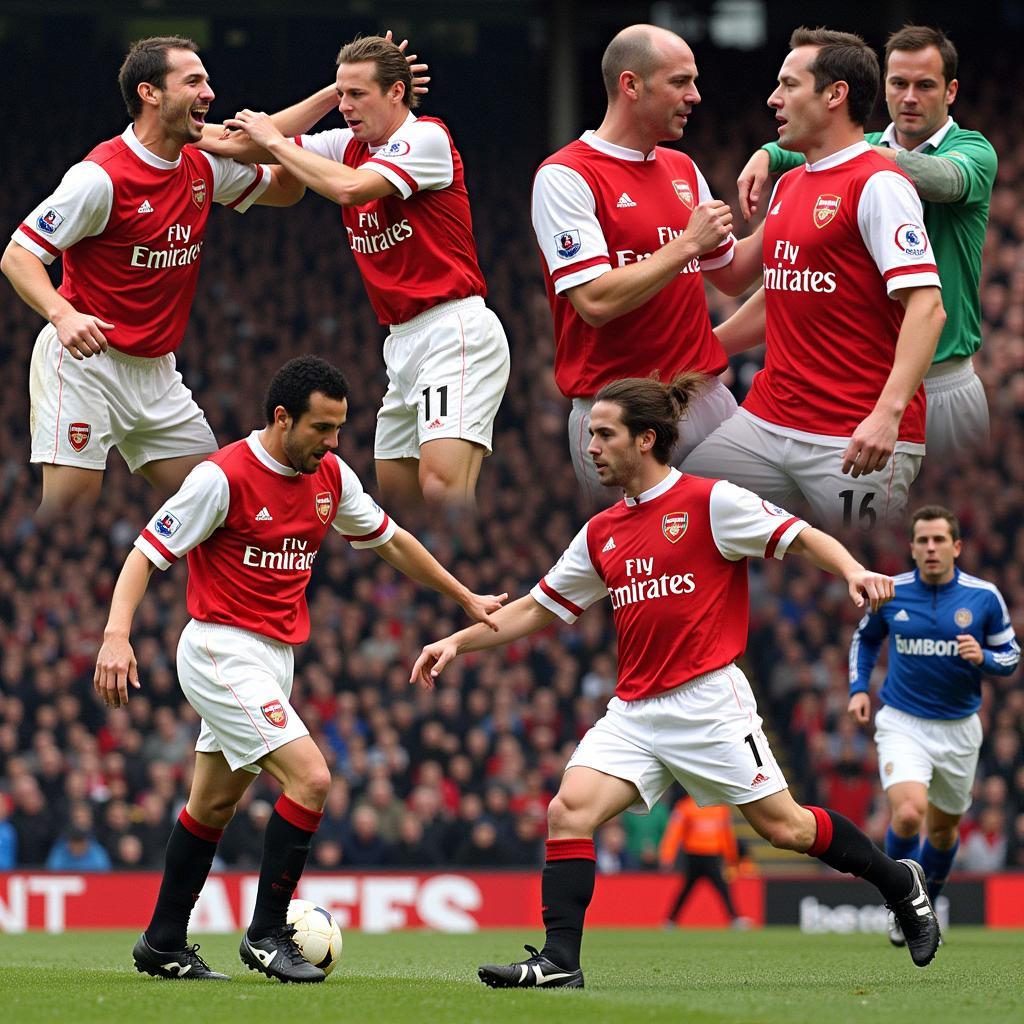The intriguing phrase “Arsenal fans obsessed with Man Utd” pops up more often than you might think. It suggests a fixation, a rivalry that transcends the usual sporting competition. But how much truth is there to this claim? This article delves into the complex relationship between these two football giants and their respective fanbases, exploring the history, the banter, and the underlying psychology that fuels this perceived obsession.
The Roots of the Rivalry
The rivalry between Arsenal and Manchester United is one of the fiercest and most storied in English football. It’s a rivalry steeped in history, fueled by periods of intense competition for trophies and dominance. From the Invincibles of Arsenal to the treble-winning Manchester United side, both clubs have experienced periods of unprecedented success, further intensifying the competition. The battles between legendary managers Sir Alex Ferguson and Arsène Wenger added another layer of intrigue, with their tactical mind games and often heated exchanges becoming a staple of the Premier League era. These clashes often spilled over into the stands, with fans engaging in passionate banter and fierce debates. This back-and-forth between the two sets of supporters undoubtedly contributed to the perception of an obsession.
The late 90s and early 2000s witnessed some of the most memorable clashes between these two titans. Keown’s infamous celebration in Van Nistelrooy’s face, the “Battle of Old Trafford,” and Vieira’s midfield duels with Keane are just a few examples that spring to mind. These moments, etched in the collective memory of both fanbases, continue to fuel the rivalry to this day.
 Arsenal and Manchester United classic rivalry moments
Arsenal and Manchester United classic rivalry moments
Beyond the Banter: Is it True Obsession?
While the term “obsessed” is often used hyperbolically in the context of football rivalries, there’s an element of truth to the heightened awareness Arsenal fans have of Manchester United. This isn’t necessarily an unhealthy fixation, but rather a consequence of the two clubs’ historical significance and their frequent battles for supremacy. When a rival team is consistently performing well, it naturally draws attention. Fans want to know how their team stacks up, analyze the competition, and understand the threats and opportunities that the rival presents.
Why do Arsenal Fans Seem So Focused on Man Utd?
This perceived obsession stems from several factors. Firstly, the shared history of success creates a natural point of comparison. Both clubs have tasted glory at the highest level, and fans are constantly measuring their team’s current performance against the benchmark set by their rival’s past achievements. Secondly, the media plays a significant role in amplifying the rivalry. News outlets often focus on the narrative of competition, highlighting any perceived animosity between the two clubs and their fans. This can create an echo chamber effect, where the perception of obsession becomes reinforced through constant media exposure.
A Healthy Rivalry or Something More?
Ultimately, the relationship between Arsenal and Manchester United fans is a complex one. While the banter can sometimes be intense, and the scrutiny of each other’s performances can be relentless, it’s largely a healthy rivalry born out of mutual respect and a shared history of competing at the highest level. The perception of obsession, while often exaggerated, is a testament to the significance of this rivalry in the landscape of English football.
How Does This Rivalry Impact the Teams?
The intense competition between Arsenal and Manchester United undoubtedly motivates both teams to perform at their best. The desire to outdo their rival can be a powerful driving force, pushing players to elevate their game and strive for victory. This rivalry adds an extra layer of excitement and drama to the Premier League, captivating fans and generating global interest.
“The rivalry between Arsenal and United is special,” says fictional football pundit, James O’Leary, former Premier League midfielder. “It’s driven by history, ambition, and a deep-seated desire to be the best. It’s what makes football so compelling.”
 Arsenal and Manchester United fans banter
Arsenal and Manchester United fans banter
Conclusion
The narrative of “Arsenal fans obsessed with Man Utd” is more nuanced than it first appears. It’s a story of intense competition, historical significance, and the passionate engagement of two massive fanbases. While the term “obsessed” might be an overstatement, the rivalry between these two clubs is undeniable, and it continues to captivate the world of football.
FAQ
- Why are Arsenal and Man Utd rivals? Their history of competing for major trophies, especially in the late 90s and early 2000s, cemented their rivalry.
- Is the rivalry between Arsenal and Man Utd fans always negative? While intense, it’s often based on mutual respect and a shared passion for the game. Much of the “obsession” narrative is exaggerated for effect.
- What are some of the most memorable matches between Arsenal and Man Utd? The “Battle of Old Trafford” and matches featuring iconic moments like Keown’s celebration over Van Nistelrooy stand out.
- How has the rivalry changed over the years? With both teams experiencing periods of rebuilding, the dynamic has shifted, but the core rivalry remains.
- Do the players feel the rivalry as much as the fans? Absolutely. The desire to beat a major rival is a significant motivator for players on both sides.
- What role does the media play in this rivalry? The media often amplifies the narrative of competition, sometimes exaggerating the animosity between the two fan bases.
- Is the “obsession” narrative harmful? Not necessarily. Healthy rivalries can add to the excitement and passion of the sport, but it’s important to keep things in perspective.
Need more football insights? Explore our other articles on Premier League rivalries and team analyses on Fans Bóng Đá.
When you need support, please contact us: Phone: 0903426737, Email: fansbongda@gmail.com Or visit us at: Lot 9, Area 6, Gieng Day Ward, Ha Long City, Gieng Day, Ha Long, Quang Ninh, Vietnam. We have a 24/7 customer service team.


